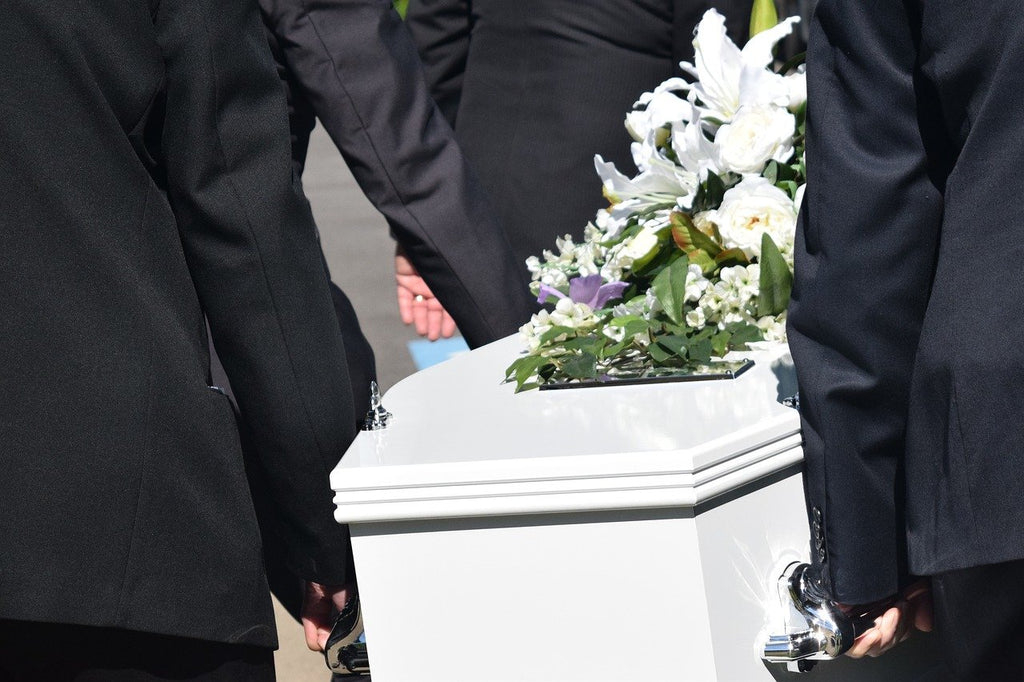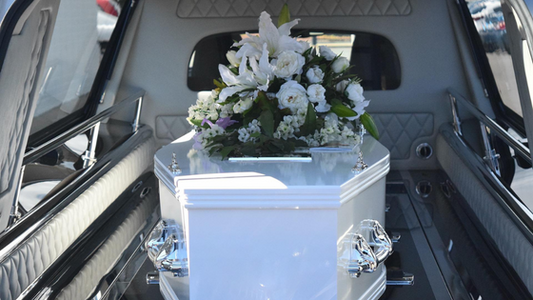Funerals can be costly, and many people don't know what to expect when planning one. You might be surprised to learn that the average funeral cost is $8,300, including a viewing and burial service. This price can go up if you add extras like a vault.
Funeral expenses add up quickly. You'll need to consider things like the casket, embalming, use of the funeral home, and transportation. Each has its own price tag, so it's wise to get a clear breakdown of the costs before making any decisions.

Don't worry if this seems overwhelming. There are ways to manage these costs. Cremation, for example, is often cheaper than a traditional burial. You can also look into pre-planning or life insurance to help cover the bills. Keep reading to learn more about your options and how to plan for funeral expenses.
Understanding Funeral Costs
Funeral costs can vary widely. Let's look at what makes up these expenses, typical prices nationwide, and rules protecting consumers.
Components of Funeral Expenses
Funeral costs include several parts. The basic service fee, which covers staff time and overhead, is always included.
Other typical costs are:
- Transporting the body
- Preparing the body
- Using the funeral home for viewing
- Casket or urn
- Burial plot or cremation fee
You might also pay for flowers, printed materials, and music, which can add to the total cost.
Average Costs Across the U.S.
Funeral prices differ based on where you live and what you choose. The average funeral costs between $7,000 and $12,000. This usually includes viewing, burial, and essential services.
A breakdown of some typical costs:
- Viewing at the funeral home: $475
- Funeral service: $550
- Printed materials: $195
- Cremation fee: $400
Remember, these are just averages. Your actual costs may be higher or lower.
The Funeral Rule by the Federal Trade Commission
The Federal Trade Commission (FTC) created the Funeral Rule to protect you. This rule gives you rights when planning a funeral.
Key points of the Funeral Rule:
- You can get prices over the phone
- Funeral homes must give you a written price list
- You can buy items like caskets from outside vendors
The rule helps you compare prices and avoid overpaying. It's good to know your rights when making funeral plans.
Types of Funerals and Their Costs
Funerals come in different types, each with its price tag. Your choice will affect how much you'll spend on saying goodbye to your loved one.
Traditional Burial Services
A funeral with viewing and burial typically costs around $8,300. This includes preparing the body, a casket, and a ceremony. You might pay extra for:
- Embalming
- Funeral home rental
- Hearse
- Graveside service

The burial plot and headstone can also add thousands to your bill. A vault protecting the casket may cost $700 to $7,000 more.
Remember, prices vary by location. City funerals often cost more than rural ones.
Cremation and Associated Fees
Cremation is often cheaper than burial. A funeral with viewing and cremation averages $6,280. This includes:
- Body preparation
- Cremation fee
- Urn
- Memorial service
You can save money by skipping the viewing. Some families rent a casket for the service and then have a cremation afterwards.
Extra costs might include:
- Urn burial
- Scattering services
- Keepsake jewellery

Direct Burial and Cremation
Direct cremation is the cheapest option. It skips the funeral service and viewing. You might pay $2,000 to $4,000 for:
- Basic body preparation
- Cremation
- Simple urn
Direct burial is similar but uses a simple casket instead of cremation. It's more expensive than direct cremation but cheaper than a full funeral.
Both options allow you to hold a memorial service later if you wish. This can save you money while still honoring your loved one.
Additional Funeral Expenses
Funerals often come with extra costs beyond the basic service fee. These can add up quickly, so it's essential to be aware of them when planning. Here are some everyday additional expenses you might encounter:
Cemetery Charges
When choosing a final resting place, you'll face several cemetery costs. The price of a burial plot varies widely depending on location and demand. Urban cemeteries typically charge more than rural ones.
You'll also need to consider the cost of a headstone or grave marker. These can range from simple plaques to elaborate monuments. Prices depend on size, material, and design.
Don't forget about the interment fee. This covers the cost of digging and filling the grave after the burial. Some cemeteries charge extra for weekend services.
You might need to buy an urn or cremation container if you opt for cremation. These come in various styles and materials to fit different budgets and preferences.
Memorial Items and Services
Many families choose to honor their loved ones with special memorial items. These can include printed materials like programs, prayer cards, or guest books. You could create a photo display or memory board too.
If you're planning a memorial service, consider venue rental costs. Some funeral homes offer this service, but you might prefer a different location with special meaning.
Flowers are another common expense. You can choose from simple arrangements to more elaborate displays. Some families opt for charitable donations instead of flowers.

Remember to cater if you're hosting a reception after the service. Depending on your preferences and budget, this can be a simple coffee and cookies setup or a full meal.
Transportation and Staff Fees
Moving your loved one from place to place involves several costs. You'll need to pay for the transfer of remains from the place of death to the funeral home.
If you're having a viewing or service before the burial, you'll need to rent a hearse to transport the casket to the cemetery. Some families also rent limousines for immediate family members.
Funeral homes charge for their staff's time and services. This includes coordinating the funeral, preparing the body, and overseeing the ceremony. Remember, weekend or evening services often cost more due to overtime pay for staff.
If you're transporting the body across state lines, you'll face additional fees and paperwork. Make sure to discuss these details with your funeral director if needed.
Financing Funeral Costs
Paying for a funeral can be tough, but you have options. There are ways to plan ahead and get help with costs.
Insurance and Prepayment Options
Life insurance can help cover funeral costs. You can buy a policy that pays out when you die. This money can go to your family for funeral expenses.
Final expense insurance is a special type of life insurance. It's just for funeral costs. You can also get burial insurance or funeral insurance. These are similar and focus on end-of-life expenses.
A prepaid funeral plan lets you pay for your funeral in advance. You pick what you want and pay over time. This can save your family stress later.

Funeral Trusts and Savings
Funeral trusts are special accounts for funeral costs. You put money in, and it's there when needed. This can be a good way to save up slowly.
You can also start a regular savings account for funeral costs. Put a little money aside each month. Over time, it can grow into enough to cover expenses.
Some banks offer special funeral savings accounts. These might have better interest rates than regular savings.
Assistance Programs and Fundraising
Some programs can help with funeral costs. Some states have funds for low-income families. Veterans can get help from the VA for burial costs.
Medicaid might cover some funeral expenses. This depends on your state and situation. Check with your local Medicaid office to learn more.
You can also raise money for a funeral. Online fundraising is popular. Sites like GoFundMe let you ask friends and family for help.
Some churches and community groups offer funeral help too. They might chip in money or provide services for free.
Planning Your Own Funeral
Planning your own funeral gives you control over your final arrangements. It eases the burden on your loved ones and ensures your wishes are respected. Here are key aspects to consider when making your plans.
Choosing the Right Services
You have many options for your funeral service. A traditional funeral might include a viewing, religious ceremony, and burial. Or you might prefer a celebration of life with music and personal touches. Cremation is another choice, often less costly than burial.
Think about what matters most to you. Do you want a metal casket or a simple urn? Will you need burial vaults or grave liners? A funeral celebrant can help personalize your service.
Make a list of your preferences. Include details like songs, readings, or special mementos you'd like displayed. Your choices will guide your family and make the process easier for them.

Legal Aspects and Last Wishes
Put your funeral plans in writing. This can be part of your will or a separate document. Be clear about your wishes for burial or cremation. If you want to donate organs, state this too.
Consider a pre-need policy to cover funeral costs. This is a type of insurance that pays for your chosen arrangements. It can protect your family from unexpected expenses.
You might also want to appoint someone to carry out your wishes. This person can make sure everything goes as you planned. Choose someone you trust who understands your views.
Talking to Loved Ones
Have an open chat with your family about your plans. It might feel awkward, but it's important. Tell them what you want and why it matters to you. Listen to their thoughts too.
Explain where you've stored important documents. This includes your will, funeral plans, and any pre-paid arrangements. Make sure they know how to access these when needed.
Discuss costs openly. If you've set aside money for the funeral, let them know. If not, talk about how expenses will be covered. Being clear now can prevent stress later.
Whatever you and your loved one’s preference, we hope this helps you through this difficult time and gives you a few ideas on how to not break the bank while still having a beautiful event to say goodbye.
Whatever you and your loved one’s preference, we hope this helps you through this difficult time and gives you a few ideas on how to not break the bank while still having a beautiful event to say goodbye.










